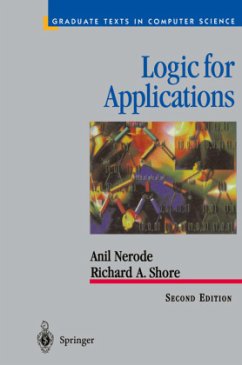In writing this book, our goal was to produce a text suitable for a first course in mathematical logic more attuned than the traditional textbooks to the re cent dramatic growth in the applications oflogic to computer science. Thus, our choice oftopics has been heavily influenced by such applications. Of course, we cover the basic traditional topics: syntax, semantics, soundnes5, completeness and compactness as well as a few more advanced results such as the theorems of Skolem-Lowenheim and Herbrand. Much ofour book, however, deals with other less traditional topics. Resolution theorem proving plays a major role in our treatment of logic especially in its application to Logic Programming and PRO LOG. We deal extensively with the mathematical foundations ofall three ofthese subjects. In addition, we include two chapters on nonclassical logics - modal and intuitionistic - that are becoming increasingly important in computer sci ence. We develop the basic material on the syntax and semantics (via Kripke frames) for each of these logics. In both cases, our approach to formal proofs, soundness and completeness uses modifications of the same tableau method in troduced for classical logic. We indicate how it can easily be adapted to various other special types of modal logics. A number of more advanced topics (includ ing nonmonotonic logic) are also briefly introduced both in the nonclassical logic chapters and in the material on Logic Programming and PROLOG.
From reviews of the first edition: "... must surely rank as one of the most fruitful textbooks introduced into computer science ... We strongly suggest it as a textbook ..." SIGACT News From the reviews of the second edition: "...the book achieves its goal of being a unified introduction into classical logic, logic programming and certain non-classical logics. ...the book succeeded in presenting a uniform framework for describing different logics. The author's thorough approach to describing logic programming, via introduction of resolution-based refutations and subsequent study of different kinds of resolutions allows the reader to gradually switch from the study of logic to the study of logical programming paradigm and provides a lot of intuition about the behavior of logic programs. As such the book can be recommended both as a textbook for senior/graduate course in logic/logic programming, and as a reading or reference for graduate students in the areas related to discrete mathematics." (Alexander Dekhtyar, William Gasarch's Book Review Column, SIGACT News)

